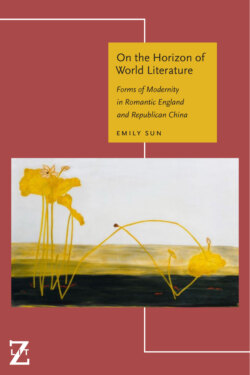On the Horizon of World Literature

Реклама. ООО «ЛитРес», ИНН: 7719571260.
Оглавление
Emily Sun. On the Horizon of World Literature
Sara Guyer and Brian McGrath, series editors
ON THE HORIZON. OF WORLD LITERATURE
Contents
Introduction
Reading Literary Modernities on the Horizon of World Literature
Toward Literary Modernity: Reading between Literary Histories and Literary Modernities
Forms of Modernity
Quests for Modernity, Inhabitations of the Ordinary
1. Literary Modernity and the Emancipation of Voice
Defenses of Poetry by Percy Bysshe Shelley and Lu Xun
Internationalism, Poetic Solidarity, and the Desire for Resonance
Defenses of Poetry: Promises of Modernity, Critiques of Modernity
2
Shakespearean Retellings and the Question of the Common Reader. Charles and Mary Lamb’s Tales from Shakespeare and Lin Shu’s Yinbian Yanyu
Shakespeare for Beginners
Figures of the Common Reader: Miranda and Prospero
3
Estrangements of the World in the Familiar Essay. Charles Lamb and Zhou Zuoren’s Approaches to the Ordinary
After the Revolutions: Two Lives
On the Way to the Ordinary
The World Estranged in “Old China” and “Wild Vegetables of My Hometown”
Distant Peers
4
Between the Theater and the Novel. Woman, Modernity, and the Restaging of the Ordinary in Mansfield Park and The Rouge of the North
Households and Heroines: Sites of Revision, Subjects in Revision
Mansfield Park and the Drama of Ordination
The Rouge of the North and the Afterlife of Ritual
Austen’s Wit, Chang’s Desolation: Irony and Companionability in the Accommodation of the Ordinary
Coda
Acknowledgments
Notes
Index
Sara Guyer and Brian McGrath, series editors
Отрывок из книги
Lit Z embraces models of criticism uncontained by conventional notions of history, periodicity, and culture, and committed to the work of reading. Books in the series may seem untimely, anachronistic, or out of touch with contemporary trends because they have arrived too early or too late. Lit Z creates a space for books that exceed and challenge the tendencies of our field and in doing so reflect on the concerns of literary studies here and abroad.
At least since Friedrich Schlegel, thinking that affirms literature’s own untimeliness has been named romanticism. Recalling this history, Lit Z exemplifies the survival of romanticism as a mode of contemporary criticism, as well as forms of contemporary criticism that demonstrate the unfulfilled possibilities of romanticism. Whether or not they focus on the romantic period, books in this series epitomize romanticism as a way of thinking that compels another relation to the present. Lit Z is the first book series to take seriously this capacious sense of romanticism.
.....
The incipience of literary modernity in China in the early twentieth century likewise gave rise to a critical disposition in practices of writing that offer critical reflections on their own status as imaginative writing while situating themselves in relation to a tradition of Chinese letters undergoing reclassification and revaluation. Like English Romanticism, the writing of early twentieth-century China gains impetus from philosophical claims informing political revolution. Like late eighteenth- and early nineteenth-century England, early twentieth-century China was a period in which questions of literary modernity were entwined with questions of political modernity.
The writings I study in this book stage quests for modernity. They ask what it is to be modern and how to address others as modern, enacting modernity as a set of questions rather than as the fulfillment of preconceived and programmatic definitions. In so doing, they take orientation from a framework of world literature as a condition of connection and comparison between languages and cultures. They take orientation also from the principles of freedom, equality, and mutuality pronounced explicitly as ideals in the turns to republicanism and democracy in the revolutions of the eighteenth century. If the Enlightenment articulates the equal authority of human beings everywhere to make laws for themselves as users of reason, the punctual, rationalist conception of modern subjectivity therein, it has often been noted, fails, often catastrophically, to acknowledge the complexity of human beings in their existences in language and history. As universal sociopolitical principles of humanity, freedom, equality, and mutuality are by themselves empty. They have substance only in the actuality of language or, more precisely, of languages that serve as vital mediums of inhabitation and imagination and thus operativity and efficacy. The efforts to write literary modernity in England and China at issue in this study reckon with how to be modern by grappling insistently with the question of how to address others as free and equal subjects in evolving configurations of mutuality. This ethical and philosophical endeavor is at the heart of their (self-)critical disposition.
.....